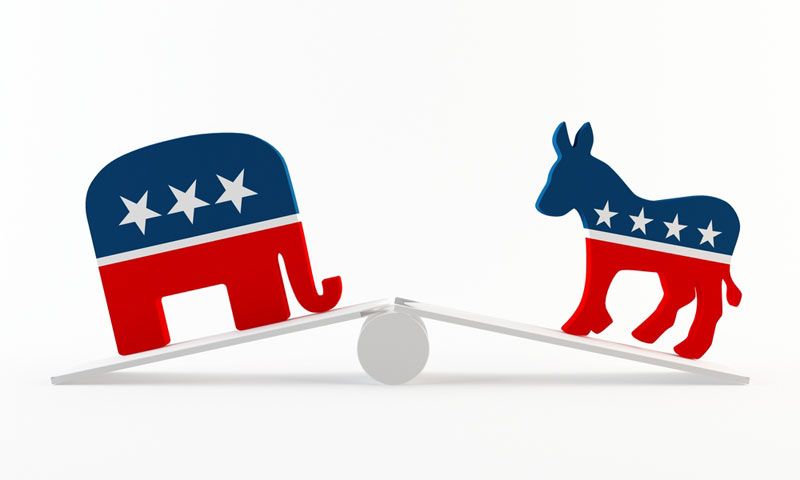Why Conservatives Have Better Self-Control

Conservatives may have more self-control than liberals, a new study suggests.
The study researchers posit that the differences in self-control may stem from beliefs about free will, or the concept of being "responsible for your outcomes," as the study's lead author, Joshua Clarkson of the University of Cincinnati, told Live Science. "If you do really well on a test, to what extent do you say, 'Well, I was responsible for that?'"
A believer in free will might give herself a pat on the back; someone less convinced might give more credit to the teacher or the study guide, Clarkson said.
"Effective self-control comes down to the extent to which you believe that you can control your behavior," Clarkson said. "At the end of the day, the default seems to be that conservatives more strongly believe that they can control their behavior … than liberals." And conservatives do control their behavior better than liberals, according to the study. [Life's Extremes: Conservatives vs. Liberals]
The science of political ideology
Plenty of studies have suggested liberals and conservatives have more than just differing opinions about the world. A 2008 study showed that one could tell conservatives from liberals by looking at their offices: Conservatives' offices are organized but drab, on average, while liberals' workspaces are messy and colorful.
Previous studies have even associated political ideology with a variety of seemingly innate tendencies: Conservatives seem to be more easily startled by threatening images than are liberals, according to a 2008 study published in the journal Science. A 2011 study revealed conservatives to be more squeamish. And in 2012, scientists reported that given an array of images, conservatives tend to pay more attention to negative, threatening or disgusting images than do liberals, who seem to be more drawn to comforting, happy pictures.
Sign up for the Live Science daily newsletter now
Get the world’s most fascinating discoveries delivered straight to your inbox.
Little research, however, exists about how political ideology relates to free-will beliefs and self-control, and that is what Clarkson and his team at the University of Cincinnati and colleagues elsewhere set out to determine.
The researchers predicted that because conservatives tend to attribute the way people's lives turn out to individual, internal causes, these conservative individuals probably believe in free will. "Indeed, believing outcomes are determined by internal factors such as personal effort not only implies but essentially requires the belief that one possesses the free will to effect change," the authors write in their research detailed on June 22 in the journal Proceedings of the National Academy of Sciences. In contrast, if people believe they are less in control of, and thus less responsible for, their actions, they might be less concerned about their performance and might not expend as much effort to achieve a given goal, the researchers hypothesized.
Differing perspectives on free will could explain several political differences among conservatives and liberals, the researchers surmised: One who believed less strongly in free will might arguably be more likely to attribute poverty, addiction and other hardships to sociological, economic and other factors beyond individual control. Such individuals might thus conclude, as many liberals do, that people struggling deserve government help. On the other hand, a believer in free will might be more likely to think people cause their own problems and should also solve them, rather than relying on government support, a typical conservative position.
Free-will beliefs
To sort out the relationships among these variables, the researchers first tested 147 undergraduates on their performances on a "Stroop task," in which participants had to read a word flashed onto a computer screen: The words were the names of colors, often written in a different hue (for instance "red" would be in shown in green font). The mismatch between the word and the color makes this tricky, and a person's speed at the Stroop task is a measure of his or her ability to focus attention, one aspect of self-control. [The 10 Greatest Mysteries of the Mind]
After the Stroop task, participants completed surveys about their political ideologies. The result? Liberals and conservatives read the color words with equal accuracy, but conservatives did so significantly faster than liberals, suggesting the conservative participants were better able to focus.
Next, working with 176 undergraduate students, the researchers paired another Stroop task with a survey to assess beliefs in free will. The accuracy and response-time results matched those from the first study. The key finding, Clarkson said, was that conservatives believed more strongly in free will than did liberals. Using statistical analyses, Clarkson said, "we were able to show that this relationship between political ideology and self-control is driven by people's beliefs in free will."
To directly test whether the belief in free will was behind these differences in self-control, the researchers manipulated participants' beliefs by having them read one of two fictitious research articles: one reporting that free will enhances self-control and the other reporting that free will undermines it. The researchers then tested participants' persistence on an anagram task in which they had to create new words from a given set of letters, assigned through Amazon Mechanical Turk, a crowdsourcing system that pays workers pennies to complete small online tasks. In this case, researchers measured persistence as the time participants kept at the task before giving up, Clarkson said.
When conservatives were primed to believe that free will diminishes self-control, they performed less well on the task than those conservatives who read about how free will boosts self-control. In contrast, when liberals were told that free will diminishes self-control, they performed better than liberals who were told the opposite. Among all participants told that free will undermines self-control, the liberals outperformed the conservatives. In this test, participants' self-control seemed to depend not on political ideology alone but on free-will beliefs (inferred from political ideology) and what participants had been led to believe about the relationship between free will and self-control, supporting the conclusion that beliefs about free will are mediating the observed relationship between political ideology and self-control.
To apply these findings, new strategies to encourage self-control could take into account people's beliefs about free will, Clarkson said. Encouraging people to focus on internal factors might motivate self-control in conservatives, while urging people to focus on external factors, for example, to "put people in a community environment where they're able to lean on others" might elicit better self-control in liberals. Testing these ideas is an area for future research, Clarkson said.
Follow Ashley P. Taylor on Twitter @crenshawseeds. Follow Live Science@livescience, Facebook & Google+. Original article on Live Science.

Ashley P. Taylor is a writer based in Brooklyn, New York. As a science writer, she focuses on molecular biology and health, though she enjoys learning about experiments of all kinds. Ashley's work has appeared in Live Science, The New York Times blogs, The Scientist, Yale Medicine and PopularMechanics.com. Ashley studied biology at Oberlin College, worked in several labs and earned a master's degree in science journalism from New York University's Science, Health and Environmental Reporting Program.










